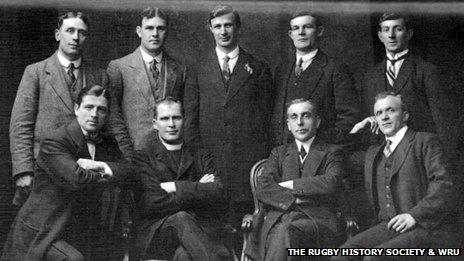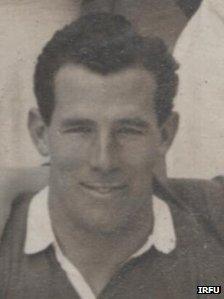Wales v Ireland: Rugby's 'most violent game' re-told
- Published

The Wales pack were known as The Terrible Eight long before the Ireland game
Despite their Celtic heritage, there is often little love lost between Wales and Ireland on the rugby field.
The sides have battled it out since the now Six Nations was a 19th Century contest of the four home countries.
And in a game that has pain designed into it, they can lay claim to a match that has been written up as the most violent in the competition's history.
On Sunday night, BBC Wales' Scrum V Six Nations preview programme looks back at 13 March 1914 - and a clash overshadowed by a looming world war.
The Welsh pack were already dubbed the Terrible Eight. And they were challenged all the way by their Ireland counterparts.
Though, as programme presenter Eddie Butler explains, the battle had all but started the night before.
He said: "It's the eve of Wales' last international before the outbreak of the First World War.
"Wales play Ireland away in Belfast, and the evening before the game the captain of Wales, The Reverend Alban Davies, decides to take his team for a quiet night out at the theatre.
"The Welsh forwards - the so-called Terrible Eight - are all sitting comfortably in the stalls when into the theatre walked Belfast boy and Irish pack leader Billy Tyrell and some of the Irish players.
"They too have heard of The Terrible Eight."
Exact accounts of what followed differ, and have altered over the years.
Some accounts have it that the exchange resulted in a brawl there and then, and that the police had to be called to the theatre that night.

Air Vice-Marshal Sir William Tyrell in his earlier rugby playing days
However many decades later both of the main protagonists - Ireland's Billy Tyrell and Wales' Percy Jones - agreed that the conversation went something like this.
"Where's this Percy Jones?" said Tyrell, singling out the Welsh enforcer. "It's you and me for it tomorrow, Jones."
Jones replied: "I'll be with you. Doing the best I can."
To which Jones's former Newport team-mate Harry Uzzell piped up: "Can anyone join in? I'll be with you."
The following day the quagmire of the Balmoral showground on the outskirts of Belfast in the pouring rain provided the perfect setting for settling scores.
Ireland took an early 3-0 lead, but even before that Tyrell had caught Jones with a punch the Wales lock later said had rattled his brains.
Butler said: "Wales retaliated - Jones on Tyrell, Tyrell on Jones, forward on forward, on the ball, off the ball - before long everybody was involved.
"The Scottish referee simply let them get on with it.
"Journalists reported it 'the roughest game ever'."
The fact that Wales won 11-3 was virtually lost in the aftermath.
Final whistle
But while the legend has lived on down the years, the feud itself was initially forgotten - at least until the Sunday newspapers which first made it famous had hit the doormats.
Immediately after the final whistle Tyrell sought out Jones and congratulated him, saying: "You're the best Welshman I've come across. The only man ever to beat me."
The pair signed each other's menu at dinner that night, and would later go on to sit side-by-side when their teams met in Cardiff 37 years later in 1951.
By then Tyrell was Air Vice-Marshal Sir William Tyrell, surgeon to King George VI.
But some of those who clashed a century ago would not be so fortunate, because just a few months later many saw active service in World War 1.
Killed in action
Tyrell and Davies were soon on war service - one a doctor in the Royal Army Medical Corps and the other a chaplain of the Royal Field Artillery.
Others went off to war too. Jasper Brett and Vincent McNamara of the Irish team did not come home. Dai Watts of the Terrible Eight was killed in action at Bazentin Ridge in France in 1916.
The Terrible Eight were never to have the chance to play together again.
Eddie Butler tells the full story of The Terrible Eight in Scrum V's Sunday Six Nations preview from 18:00 GMT on Sunday on BBC Two Wales
- Published28 November 2013
- Published11 September 2013
- Published12 September 2013